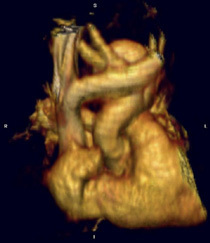
Prospective ECG triggering
enables the CT scanner
to monitor the ECG
signal of several heart beats
in real time and turns
the radiation beam on
only during alternate beats
ER physicians who evaluate patients with non-specific chest pain using whole chest multi-detector CT (MDCT) combined with retrospective electrocardiogram (ECG) gating can reduce their patients' radiation dose 71% by using MDCT combined with prospective ECG triggering instead, according to a study performed at the University of Washington School of Medicine, Seattle, WA.
Prospective ECG triggering enables the CT scanner to monitor the ECG signal of several heart beats in real time and turns the radiation beam on only during alternate beats; retrospective ECG gating also monitors the ECG signal of heartbeats but turns the radiation beam on throughout several consecutive beats, thus delivering more radiation, according to the study.
Investigators enlisted 72 emergency room patients with non-specific chest pain. All were referred for MDCT of the whole chest. A total of 41 patients were scanned using retrospective gating and 31 were scanned using prospective triggering.



Ad Statistics
Times Displayed: 2876
Times Visited: 27 Fast-moving cardiac structures have a big impact on imaging. Fujifilm’s SCENARIA View premium performance CT brings solutions to address motion in Coronary CTA while delivering unique dose saving and workflow increasing benefits.
"The average radiation dose delivered with retrospective gating was approximately 32 mSv; the average radiation dose delivered with prospective triggering was 9 mSv," said William P. Shuman, MD, lead author of the trial.
In addition, image quality was slightly better with prospective triggering, he said.
"As our study suggests, patients benefit from MDCT scans using ECG triggering because it delivers a much lower radiation dose-opening the utility of CT to more patients. This lower dose is particularly useful when non-specific indications suggest scanning of the whole chest, such as in the triple rule-out," Dr. Shuman said.
Cost-effective and Swift
He noted that ERs face severe congestion and cost constraints in today's world, plus a need for accurate, swift diagnosis. Lower dose, high image quality ECG triggered CT will help significantly on all of those fronts," Dr. Shuman said.
This study appears in the June issue of the American Journal of Roentgenology.

